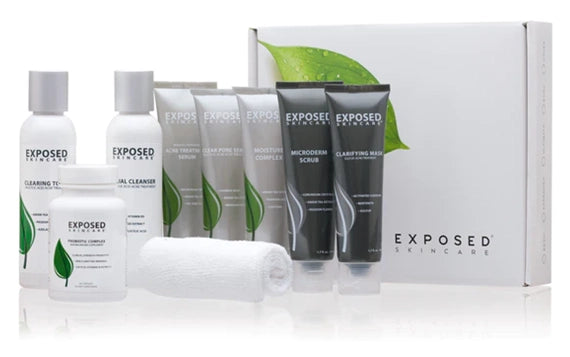Acne is a complex skin condition influenced by factors such as hormone imbalances. While many are tempted to use herbal remedies as a natural remedy for hormonal acne, it's essential to understand the intricacies of such treatments.
This article dives into why using herbs for acne hormones might not be the most effective approach.
Also read: How to choose the best acne treatment
Biggest Take-Aways:
- Hormonal imbalances, influenced by various factors, are the primary causes of acne.
- Herbal remedies, though natural, might not always be effective in addressing acne's root causes.
- There is limited research on the effectiveness of some herbal remedies for acne.
- Exposed Skin Care provides a comprehensive and effective solution, combining natural ingredients with scientific research, to address acne at its core.
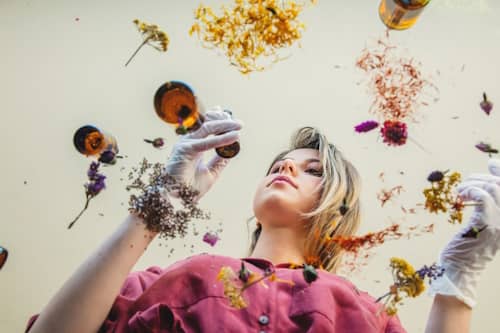
Herbal Remedies Might Not Address the Root Cause
Hormonal acne is often linked to hormone imbalances, especially in hormones like testosterone, estrogen, and progesterone. Factors like PCOS, menopause, and irregular periods can further complicate this imbalance.
While many believe that herbal medicine can balance hormones, it's essential to note that not all herbs effectively address hormonal imbalances.
Inconsistent Results with Herbal Treatments
The efficacy of herbs like dandelion, chaste trees, and even popular ones like tea tree oil varies. While some might experience clear skin after using these remedies, others might see an increase in acne breakouts.
Complexity of Hormonal Acne
The cause of hormonal acne isn't just about an overproduction of oil or sebum production. Factors like blood sugar levels, insulin resistance, and irregular menstrual cycles play a significant role. Merely using herbs might not address these complexities.
Potential Side Effects and Irritations
Just because a remedy is natural doesn't mean it's free from side effects. Many herbal remedies can cause irritation, redness, and even worsen acne in some cases.
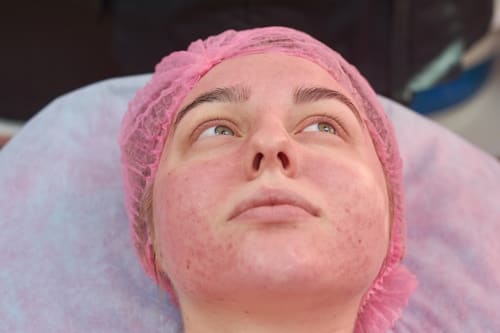
Skin Herbal Oils
Often touted as a natural remedy for hormonal acne, skin oils can sometimes cause redness and irritation, especially when applied directly to the skin without dilution.
Herbs and Hormonal Balance
Some herbs, believed to balance your hormones, might disrupt the delicate hormonal balance. For instance, certain herbs might interfere with ovulation or even affect insulin levels, leading to further complications.
Not All Herbs are Equal in Efficacy
Herbal medicine is vast, and not all herbs are created equal when treating acne. While some might help reduce acne, others might increase acne.
Varying Concentrations
The therapeutic properties of herbs depend on their concentration. A diluted herbal remedy might not offer the best results, while a potent one might cause more harm than good.
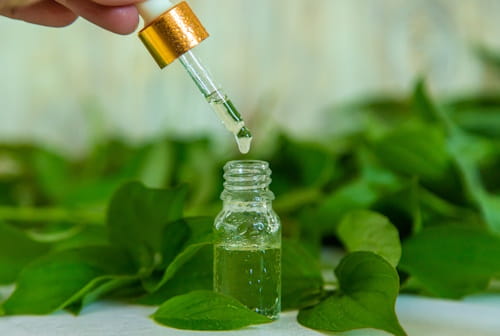
Lack of Standardization
Unlike conventional acne treatments, like benzoyl peroxide, herbal remedies lack standardization. This means that the efficacy of a remedy can vary significantly from one brand to another.
Overlooking Other Effective Treatments
While herbal remedies might seem appealing due to their natural origin, it's essential not to overlook other effective treatments for acne.
Topical Treatments
Products designed to treat acne topically, like those that address sebum production, can be beneficial. These products aim to clear the pores, reduce sebum, and eliminate dead skin cells, leading to a clearer complexion.
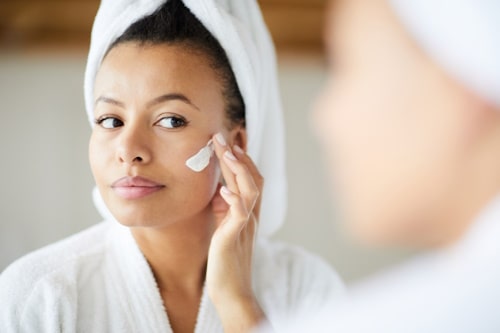
Addressing Blood Sugar Imbalances
Acne can sometimes be a result of blood sugar imbalances. Instead of solely relying on herbs, focusing on a balanced diet and maintaining blood sugar balance can prove helpful for women with PCOS or those in perimenopause.
Limited Research on Herbal Remedies for Acne
While certain herbs have been used for centuries, there's limited scientific research on their efficacy in treating acne.
Inconsistent Studies
Many studies on herbal remedies often have inconsistent results. For instance, while some research might suggest that a particular herb helps to improve acne, others might show no significant difference.
Lack of Comprehensive Data
Herbal remedies like chaste trees or dandelions might have anti-inflammatory and antimicrobial properties, but comprehensive data on their long-term effects or interaction with other treatments is limited.
Benefits of Using Exposed Skin Care for Acne Management
Addressing hormonal acne naturally is a top priority for many people with acne. Exposed Skin Care provides an effective solution that targets the root causes of acne.
Here are some compelling benefits of Exposed Skin Care:
- Reduction in Inflammation: The products are designed to reduce redness and inflammation, common symptoms of acne caused by acne-causing bacteria.
- Targeted Treatment: Different areas of the face can have varied acne causes. Exposed Skin Care comprehensively addresses these issues, from oil production in the T-zone to pimples caused by clogged glands.
- Natural Ingredients: Exposed Skin Care mixes scientific and natural ingredients to provide comprehensive treatment.
- Ease of Use: Simply apply the product to your skin using a cotton pad first thing in the morning. It's safe for women in perimenopause, pregnant women, and those navigating the challenges of perimenopause and menopause.
Exposed Skin Care offers a comprehensive approach to skincare rooted in naturopathic medicine principles, ensuring that your journey to clear skin is natural and effective.
Conclusion
Hormonal imbalances are often a significant cause of acne, presenting challenges for many individuals seeking clear skin. Various factors, from genetic predispositions to lifestyle choices, can lead to acne.
Among many treatments available, it's crucial to understand that not every remedy will address the root cause of acne, including conditions like polycystic ovarian syndrome and issues related to hormone levels and insulin resistance.
While some methods help to reduce inflammation and redness, others have been shown to increase oil production, exacerbating the issue. Effective treatments help to regulate these imbalances, ensuring a holistic approach to skincare.
Exposed Skin Care offers a solution that goes beyond surface-level treatments. By targeting the underlying causes of acne and providing a comprehensive skincare regimen, it presents a promising avenue for those seeking clarity in their skin.
FAQs
What causes hormonal acne?
Hormonal imbalances, often influenced by conditions like polycystic ovarian syndrome and changes in hormone levels, are significant contributors to acne.
Are all herbal remedies ineffective for acne?
Not all, but their efficacy can vary. While some might help reduce acne, others might not address the root causes or even exacerbate the condition.
Is tea tree oil a reliable remedy for acne?
Tea tree oil has antimicrobial properties but can cause irritation and redness for some individuals when applied undiluted.
How does insulin resistance impact acne?
Insulin resistance can lead to hormonal imbalances, which can cause or exacerbate acne.
How can Exposed Skin Care help with acne management?
Exposed Skin Care offers a comprehensive approach rooted in natural and scientific ingredients, targeting the root causes of acne and ensuring a balanced skincare regimen.












